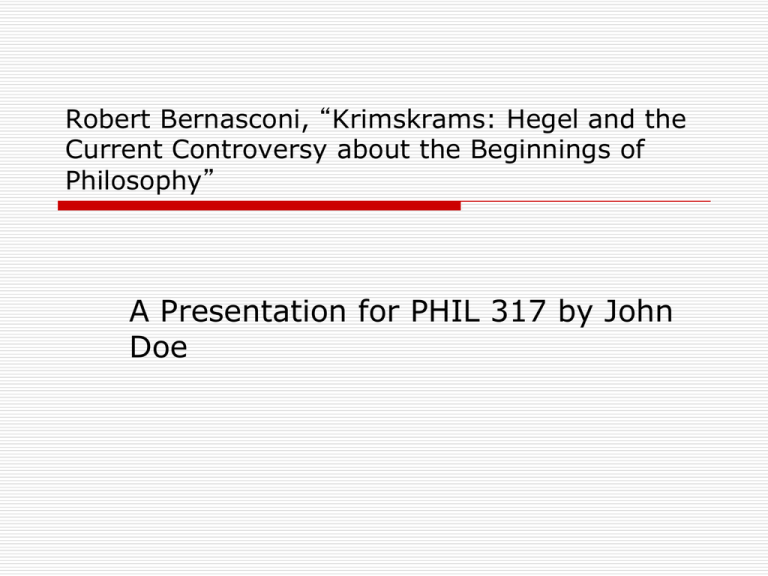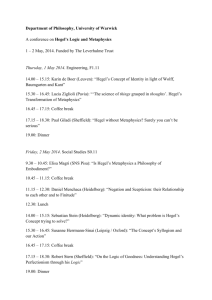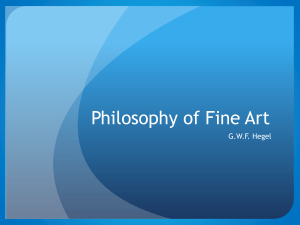KrimsKrams Presentation
advertisement

Robert Bernasconi, “Krimskrams: Hegel and the Current Controversy about the Beginnings of Philosophy” A Presentation for PHIL 317 by John Doe The Thesis In his article, Bernasconi sets out to examine the status of the belief that philosophy begins with the Greeks. As such, he proposes to focus on Hegel, one of the first to argue for the Greek origin of philosophy, and show how partial and dubious Hegel’s case is. A key part of his examination is the insistence that this is not a historical question, but a philosophical one. It’s also significant that Hegel insisted that every major philosopher who takes up the tradition does so with assumptions about the nature of philosophy. Lectures on the History of Philosophy Bernasconi spends most of his time focusing on Hegel’s Lectures on the History of Philosophy. This book is a compilation of 6 different lecture courses that Hegel gave at the University of Berlin. The most recent edition allows scholars to examine the differences from each of the years, and the issues and concerns that Hegel kept coming back to. What counts as historical? One of the questions which Hegel was preoccupied by was, “What should be included in the history of philosophy?” Hegel was concerned to exclude the nonphilosophical and to make what is essential about philosophy appear as essential. To accomplish this, he presents the history in an explicitly narrative form. Bernasconi points out that this decision has important implications for Hegel’s question. Decisions are made based on the demands of the narrative structure as defined by Hegel’s understanding of the nature of philosophy. A Vicious Circle? As Bernasconi observes, the dependence of the narrative about the emergence of philosophy on a conception of philosophy seems to involve a circularity in thinking. This isn’t a problem says Hegel, because the movement of thought in the history of philosophy follows the internal necessity of the concept of philosophy and thus we can recognize that the circle is not a vicious one, but is rather necessary. One Necessity: Emancipation One thing that the structure of the concept requires/produces according to Hegel is that philosophy is constituted in part as an emancipation from religion. This insistence, a reflection of Hegel’s participation in the Enlightenment, is part of Hegel’s rejection of claims that movements like Pythagoreanism had its roots in African and Asian religions. Another Necessity: One Root Hegel also insisted that the nature of philosophical conceptuality requires that philosophy have one and only one origin. The question remains, “Why is that one origin Greece?” As Bernasconi details it, the answer lies in a wideranging debate going on at the time about the nature and character of Greek religious belief which provided Hegel with the resources he needed to argue for a decisively Greek origin. To the extent that Hegel’s position depends on the axes he’s grinding in the debate, we should wonder if they really exhibit the necessity he insists on. A Wrinkle: Indian Philosophy? The picture is even more complicated when Hegel is confronted by the first detailed studies of the products of Indian texts like the Bhagavad Gita. Acknowledging ultimately that there is much of philosophical significance in this and related texts, Hegel includes discussion of them in the later courses on the history of philosophy but still insists that philosophy begins in Greece. He does so, however, without much in the way of argumentation. The Takeaway In the end, Bernasconi insists that there is little justification beyond Hegel’s assumptions about the nature of philosophy to justify his insistence on its Greek origins. It is, he suggests, a myth, having the status of that which philosophy is supposed to overcome. Which suggests that this claim to overcoming is a myth as well. Where are we?: if the question of the status of the beginning of philosophy is not just about philosophy’s past, but also about its future, than the increasing criticisms about the Greek origins of philosophy tell us something important about that future.






